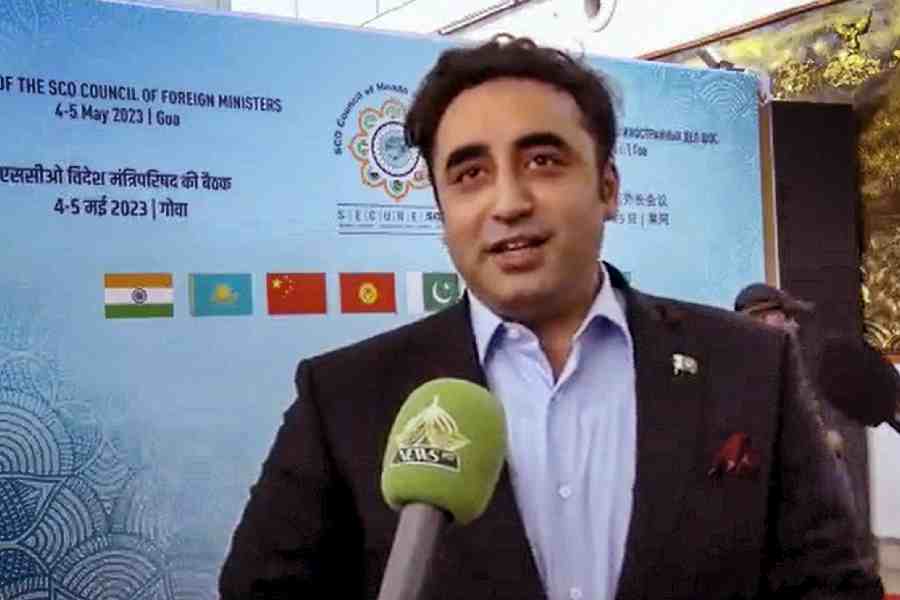Pakistan Foreign Minister Bilawal Bhutto-Zardari on Friday called for a collective approach by the SCO to combat terrorism and not get caught up in "weaponising terrorism for diplomatic point scoring".
His remarks at the India-hosted conclave of the Shanghai Cooperation Organisation (SCO) in Goa came shortly after External Affairs Minister S Jaishankar said terrorism in all its forms, including cross-border terrorism, must be stopped.
"... We firmly believe that there can be no justification for terrorism and it must be stopped in all its forms and manifestations, including cross-border terrorism," Jaishankar said, in an apparent reference to Pakistan's support to terrorist activities against India.
Bhutto-Zardari in his address said terrorism continues to threaten global security and that collective security of our peoples is our joint responsibility.
"Let's not get caught up in weaponising terrorism for diplomatic point scoring," he said, in comments seen as a veiled dig at India.
He also talked about the need for ensuring respect for universally recognised principles such as peace, cooperation, regional integration and economic opportunities within the SCO.
"Unilateral and illegal measures by States in violation of international law and Security Council resolutions run counter to the SCO objectives. We need to be unambiguous in keeping our commitments and charting out a new future for our people. One that is not based on conflict preservation but on conflict resolution." he said.
Though Bhutto-Zardari did not make any specific references or clarified the context, his remarks are seen as an indirect reference to India's policy on Kashmir.
The text of his speech was released by the Pakistan foreign ministry.
Ties between India and Pakistan came under severe strain after India announced withdrawing special powers of Jammu and Kashmir and bifurcation of the state into two union territories in August 2019.
On combating terrorism, the Pakistan foreign minister said a collective approach is required to deal with the challenge.
"When I speak on this topic, I do so not only as the Foreign Minister of Pakistan whose people have suffered the most in terms of number of attacks and number of casualties. I also speak as the son whose mother was assassinated at the hands of terrorists," he said.
"I feel the pain of this loss, empathise with victims across the world a way most can't. I and my country are firmly committed to be part of regional and global efforts for eradicating this menace. This requires not only a comprehensive approach but also a collective approach," he added.
"It requires that we let this challenge unite us to fight it rather than divide us to become its victim. Our success requires us to isolate this issue from geo-political partisanship," he said.
The Pakistan foreign minister said "practical and pragmatic solutions exist for us to put an end to this chapter once and for all." "We must stop conflating non-state actors with state actors," he noted.
India has been attempting to drum up global support to put pressure on Islamabad to dismantle the terror infrastructure with the country as a number of Pakistan-based terror groups carried out a series of attacks in India in the last several years, including the Mumbai terror attacks in 2008.
Talking about various challenges facing the region, Bhutto-Zardari said the solution to the collective challenges should be collective action, and not a divided reaction.
"While our problems may seem immense, I believe as a united human race we have the capacity to not only deal with the challenges but to learn lessons for our collective good, and build in the resilience that will equip us to address future challenges," he said.
"We must isolate these issues from hyper-partisan geopolitics if we are to succeed. Our excuse cannot be we were too divided to put up a fight," Bhutto-Zardari added.
Highlighting the need for poverty alleviation in the region, he said it can be addressed through common efforts and by learning from each other's experiences.
Referring to the importance of connectivity, he said the China-Pakistan Economic Corridor (CPEC) can be a force multiplier for regional connectivity.
India has been strongly critical of the CPEC as it goes through Pakistan-occupied-Kashmir.
Except for the headline, this story has not been edited by The Telegraph Online staff and has been published from a syndicated feed.










